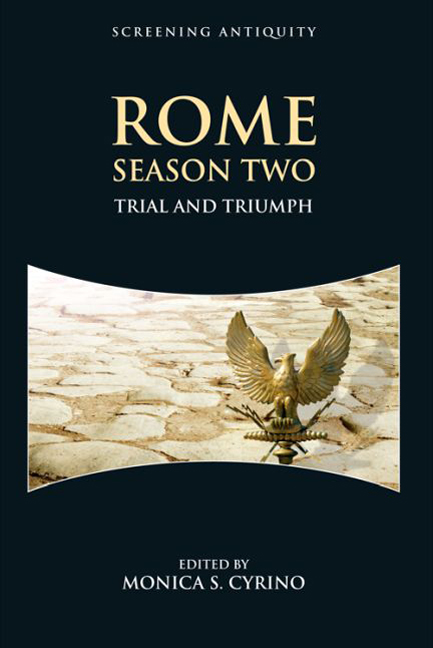Book contents
- Frontmatter
- Contents
- Series Editors’ Preface
- Editor's Acknowledgments
- Contributors
- List of Illustrations
- Episode Listing
- Cast List
- Introduction: The Trials and Triumphs of Rome, Season Two
- PART I POWER AND POLITICS
- PART II Sex and Status
- 8 Revenge and Rivalry in Rome
- 9 Effigies of Atia and Servilia: Effacing the Female Body in Rome
- 10 Livia, Sadomasochism, and the Anti-Augustan Tradition in Rome
- 11 Windows and Mirrors: Illuminating the Invisible Women of Rome
- 12 Antony and Atia: Tragic Romance in Rome
- 13 Problematic Masculinity: Antony and the Political Sphere in Rome
- 14 Rome, Shakespeare, and the Dynamics of the Cleopatra Reception
- 15 The Rattle of the Sistrum: “Othering” Cleopatra and Egypt in Rome
- 16 Gateways to Vice: Drugs and Sex in Rome
- 17 Slashing Rome: Season Two Rewritten in Online Fanfiction
- Filmography
- Bibliography
- Index
10 - Livia, Sadomasochism, and the Anti-Augustan Tradition in Rome
from PART II - Sex and Status
Published online by Cambridge University Press: 07 October 2017
- Frontmatter
- Contents
- Series Editors’ Preface
- Editor's Acknowledgments
- Contributors
- List of Illustrations
- Episode Listing
- Cast List
- Introduction: The Trials and Triumphs of Rome, Season Two
- PART I POWER AND POLITICS
- PART II Sex and Status
- 8 Revenge and Rivalry in Rome
- 9 Effigies of Atia and Servilia: Effacing the Female Body in Rome
- 10 Livia, Sadomasochism, and the Anti-Augustan Tradition in Rome
- 11 Windows and Mirrors: Illuminating the Invisible Women of Rome
- 12 Antony and Atia: Tragic Romance in Rome
- 13 Problematic Masculinity: Antony and the Political Sphere in Rome
- 14 Rome, Shakespeare, and the Dynamics of the Cleopatra Reception
- 15 The Rattle of the Sistrum: “Othering” Cleopatra and Egypt in Rome
- 16 Gateways to Vice: Drugs and Sex in Rome
- 17 Slashing Rome: Season Two Rewritten in Online Fanfiction
- Filmography
- Bibliography
- Index
Summary
In two of the more notorious scenes from the second season of Rome, Livia and Octavian are discussing and enjoying sadomasochistic sexual activities together, with Livia as the dominant and Octavian the submissive. Octavian may have been guilty of a number of things in and out of the bedroom, but he is not described in the ancient sources as possessing this particular kink. This discrepancy raises a few questions. Why did the creators of the series choose this sexual behavior in their portrayal of Livia and Octavian? Was this choice in any way informed by the historical or cinematic tradition regarding the pair? And finally, what messages are aimed at the audience through the use of sadomasochism, and are those messages different from the ancient reception of Livia and Octavian? In answer, this choice of S&M does indeed reflect historical tradition, particularly the anti-Augustan one as presented by Tacitus, and was also chosen as the most effective and efficient way of communicating the alleged dominance of Livia over Octavian to a modern audience more generally accepting of gender equality in public life.
THE FIRST COUPLE AND THE HISTORICAL TRADITIONS
We will begin with a brief background on Livia and Octavian as a couple. Rather than the match being arranged seemingly on a whim for pure political expediency, as suggested in the series, ancient accounts speak instead to the passion that preceded the marriage. The two had apparently met while she was married to Tiberius Nero, and she was pregnant with her second child, Drusus, when she went to Octavian. There were rumors that the two were involved in some way prior to her divorce from Nero, or that at the very least Octavian was smitten with her (Suetonius, Augustus 69.1; Tacitus, Annales 5.1).2 The haste with which he courted and married her was considered unseemly in some circles,3 and the two seemed to be aware of this, as they consulted the state priests to determine if the marriage would be legal and pleasing to the gods (Tacitus, Annales 1.10).
- Type
- Chapter
- Information
- Rome Season TwoTrial and Triumph, pp. 128 - 140Publisher: Edinburgh University PressPrint publication year: 2015



